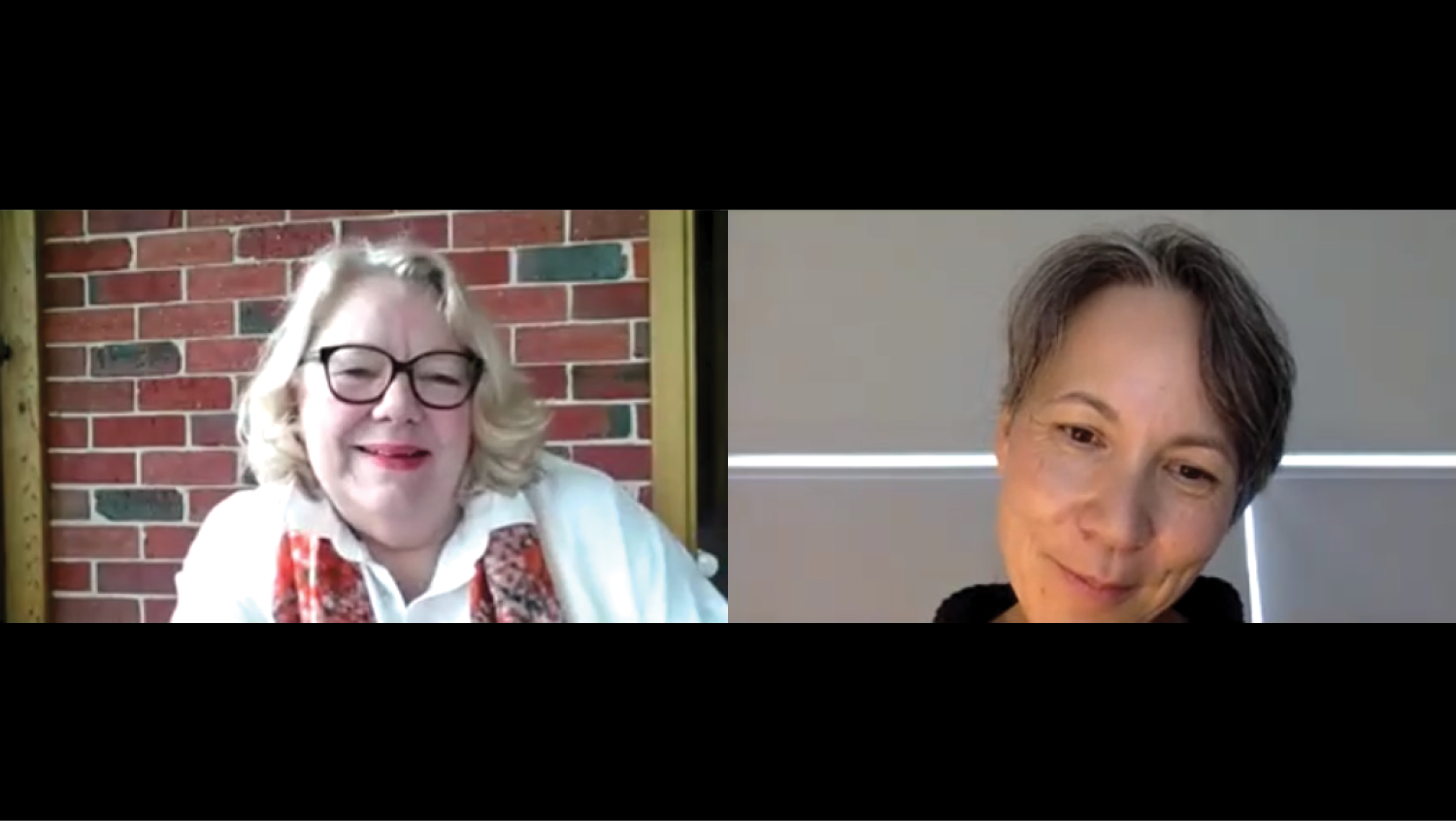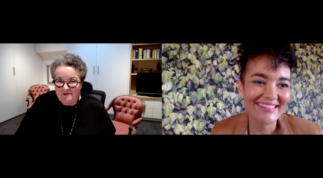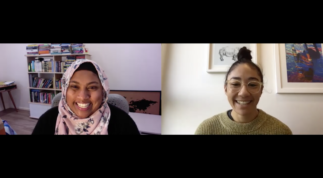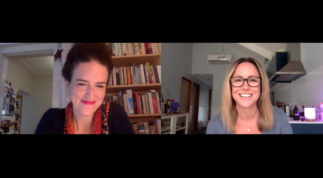The fifth edition of Feminist Fridays, presented by the Victorian Women’s Trust, was broadcast on Friday 26 June.
Featuring Alana Johnson AM (Chair, VWT); and Gabrielle Chan (author of Rusted Off: Why Country Australia Is Fed Up) unpacking the important role of women in rural recovery in the aftermath of natural disasters, not to mention a global pandemic.
Feminist Fridays is live stream series featuring two feminists talking about the issues that matter. Each chat is broadcast live on the Trust Facebook page. Next edition: Friday 10 July 2020, 12pm AEST, speakers soon to be announced.
Catch up on their conversation now, and read the full transcript below:
Transcript:
Alana Johnson: Well hello and welcome to everyone to another Feminist Friday. And I’m delighted to be joined today by Gabrielle Chan. I’m Alana Johnson, Chair of the Victorian Women’s Trust, and I’m sitting on beautiful Taungurung country near Benalla in Victoria. Where are you sitting Gaby?
Gabrielle Chan: I’m in Wiradjuri country actually, just west of Canberra.
Alana Johnson: West of Canberra. So isn’t it wonderful that because of technology we’re able to have these wonderful Feminist Fridays that have brought together women from all around the city and regional areas. So Feminist Fridays are a fortnightly series of live conversations between feminists on issues that matter. And we’re going to be short and sharp and to the point. And hopefully you can enjoy your lunch or a cup of coffee while you’re watching this or even catch up later. So to make sure you don’t miss anything, make sure to follow the Women’s Trust and RSVP to all the upcoming Feminist Fridays events and for those on Twitter remember to use the hashtag #FeministFridays. So, as I said I am sitting here with Gabrielle Chan, who is well known to me but perhaps not well known to a lot of the listeners. So Gabrielle, I’m just going to ask you to introduce yourself.
Gabrielle Chan: Yeah so I’m a Journalist, I write for Guardian Australia, among others…Meanjin. My latest book is called Rusted Off: Why Country Australia Is Fed Up that was released in 2018. I’m now working on my next one, on food and farming and environment, and yeah that’s me. I live on a farm, a sheep and wheat farm, as I say west of Canberra. So I’d like to acknowledge the Wiradjuri elders past, present and future in my place, and acknowledge how much I have learnt from them.
Alana Johnson: Yeah wonderful. So I’m the Chair of the Victorian Women’s Trust but some of the people watching might not know that I also live and work on a farm in North-East Victoria on wonderful Taungurung country. And I acknowledge their elders past and present and their emerging leaders. I’m a founding member of Australian Women in Agriculture so I’m well used to issues for women in rural and regional areas in Victoria. And the other thing that I’ve become a part of in the last few years is the establishment of a movement in North-East Victoria called Voices for Indi which is responsible for Cathy McGowan, the independent member of Parliament being elected in 2013, and the first electorate to then have an independent member of parliament follow. And that’s how Gabrielle and I first met. So Gabrielle what are your memories back in those early days of Voices for Indi…
Gabrielle Chan: Oh well I yeah, I was so amazed to find you and your crazy group called Voices for Indi that absolutely tipped up election expectations in the 2013 election that brought Tony Abbott to power. I think Indi was the only one that really went against the status quo. Just discovering your whole model, the voices for Indi model, for community development was really instructional. Not only in my political reporting but instructional in my thinking around Rusted Off and how communities develop almost well ahead of government really.
And that’s kind of informed a lot of my reporting just going forward on things like the thing we’re talking about today bushfire recovery, COVID recovery and how communities act in a very kind of changing global environment.
Alana Johnson: Yep and for those of us that realise that there’s a great amount of disillusionment with how politics is done in Australia, I can recommend reading Gaby’s book, because she really addresses some of the reasons why there’s been this upswell of people feeling that government is no longer listening to the voice of the people. So I’ll leave you with that recommendation as we turn to our topic today Gabrielle.
So I came across this quote that I thought might be a really good way to kick us off. And it came from a study that was done by Women’s Health North-East after some previous bushfires, and the quote comes from a government worker and says;
“the women have done what we expect: they get up, they help each other, they cook food, they look after the kids, they try and hold their husbands together, they do exactly in a disaster what they do every day in their lives and they put aside a lot of the own traumas.”
What a very, very accurate statement hey?
Gabrielle Chan: Yeah, it really is. And I think the thing that really struck me, both in Voices for Indi and the community development that I’ve seen elsewhere, is the connectedness of women in rural communities. I mean not just rural communities obviously. But I think rural politics and rural leadership generally at a kind of macro-level, at a national level, has been dominated by men. And it often is, it belies what’s happening at a community level and even at a party level, in parties like the National Party. I think there is a connectedness that makes women leaders and female leadership the next big phase for rural Australia.
It’s been happening for a long time but I think the most interesting thing is how that connectedness bursts into a more visible frame. And I guess what I’m seeing in the bushfire recovery and I took a drive through Batlow, Tumbarumba down to Corryong and really had a look at those communities that had been struggling with bushfire…were just starting to deal with the recovery issues of loss of housing, loss of jobs and then we’re hit by COVID, so government services shut down again.
And so in each of those communities, it’s often the women who are connecting and getting stuff done at a time when they’re under great pressure themselves. So the example that, one of the examples I saw was a kind of community market garden that is happening in Corryong. Now that’s a number of personalities in that. But the details focused people, the people that are getting that stuff done are the women who are connected into their community. And it’s quite kind of instructional to see those models next to government service models that often have trouble reacting quickly and appropriately because obviously they have processes, they have boxes to tick, but also the women have these kind of fantastic shortcuts, they know how to get stuff done in their local communities, because they’ve dealt with people. And interestingly, New South Wales has tapped into that, the New South Wales government, in terms of identifying those people as good people for short term recovery contracts. Because they can cut through…what one bureaucrat called the ‘orgy of good intentions’ to actually see what needs to be done and get it done.
Alana Johnson: Yes and Gaby, also I tend to think that there is a lot happening behind the scenes quietly, as women move around their communities and do things in ways that perhaps, don’t attract public attention or media. And I think the sort of focus on recovery after disasters is often about action and often about what men are doing. I think about Blaze Aid, building fences, which is fantastic, but nevertheless there’s this sort of real focus on “isn’t it wonderful that at all these people are coming in and taking these sort of actions to recreate people’s homes and surrounds”. But the quiet work of the women in the community, often does not get recognised.
Gabrielle Chan: Well yeah this project particularly was focused on just providing fresh food because when the bushfires came through and then COVID came through, Australians for the first time got used to the sight of seeing empty shelves. Country communities are often considered, you must, you know people often say to me “you must have all this beautiful fresh food out here!” Well if you don’t grow it, often you can’t get it! Because you know the food, crazily, often will go from being grown in paddocks nearby, into Sydney markets, back out again and by the time it gets back it’s not so fresh. So those sorts of things, getting access to nutritious food is a really big issue and women have been really involved in the provision of that.
Not to mention you know, this is another big topic for discussion, the kind of gendered impact that this year is having that these fires and the COVID recovery is having on women. We’re seeing changes. I think George Megalogenis, the journalist and author, talked about this recession being a pink-collar recession. 80s and 90s recessions really hit blue-collar workers but actually this recession is already found to be hitting women disproportionately, not only in terms of their jobs, but in terms of the burden on family. I think one Uni of Melbourne study found it equated essentially to 6 hours extra work for women.
Alana Johnson: Yep, yep. And of course you know the gendered impact and trauma that women carry goes deeper than that and perhaps also hits in a specific way in small rural communities and I’m talking about women safety there. We know that the rates of family violence increase remarkably when there’s a natural disaster. You know up to 50% some studies say.
And there’s always been a difficult context for women to stand up for their own safety in rural communities, there’s been a reluctance to report and in small communities, you know everybody knows and you even have the issues of whether people would believe what you said.
So there’s this sort of hidden burden of women trying to hold their families together and knowing that their own safety and their children’s safety is compromised. And we know that there’s been an enormous increase in women googling information and making contact with support services but we’re nowhere near good enough at responding to that or even understanding what that means in the context of small rural communities yet.
Gabrielle Chan: Yeah, and there has been a withdrawal of services over the last decade really, in terms of safe houses, in terms of services on the ground and there have been shifts. You know, I’ve noticed over the last decade the recording and reports from people like Jess Hill, who I know has been on this forum before, talking about the change in just really structural stuff. The way those contracts for those services are delivered away from local communities and to more national organisations that really don’t have the on-the-ground knowledge which I think changes things.
The other aspect is of course the social expectations. The stuff that this year has thrown at us has really pushed us back to these social expectations. So okay, if you’ve got more people in the house as I did over the last couple of months, uni students returning, that’s feeding extra people. If you have little kids at home, homeschooling. Who does the homeschooling? It’s usually the women. So all of this extra burden falls on women’s shoulders.
Alana Johnson: And the implications, Gabrielle, of what’s happening in the childcare sector, childcare has always been an issue for rural and regional women. The provision of it, the inadequacy of it, how far people have to travel to access it. And the removal of funding for free childcare which we’ve just experienced recently. You know, there’s this expectation that women will get into their communities and help them recover and do all this wonderful work, but the children will just be underfoot, and of course women will do it that way, and there doesn’t seem to be much recognition at all of what a necessary and also incredibly valued service childcare is and the great need for it in rural communities and the great need for it after disasters.
Gabrielle Chan: Mm.. Do you reckon we’re getting better at recovery? I mean you’re in Victoria, so you would have seen the last bush fires, the last really devastating bushfires. Do you think we’re getting better? I mean, my impression is that the actual organising, notwithstanding that the fires were so widespread and the resources were stretched so thin, there was a loss of life but not as much and so I felt that there was this kind of the preparation in terms of fire management that was better. But still we’re going into a recovery that is quite fractured. Someone said to me if you walked into a fire area and asked someone if they were struggling with their mental health or if you asked a woman whether they were struggling to provide all the things they have to provide in their day and they wanted help, they wouldn’t really know where to get it from. Is that your sense? Or is it..
Alana Johnson: Oh yes, I agree with you. From a Victorian point of view, I looked at our response to the actual fire this time and I think our systems worked really well. I think they worked better than I’ve ever seen them work before and thank goodness because we’re going to face more of that.
But when I look at that follow up recovery work, I think it’s still a bit of a dog’s breakfast. I mean, even getting money to people still hasn’t worked properly. The generosity of the public still hasn’t reached some people. There are people who still don’t have a roof over their head basically.
So, the whole issue of recovery and what we learn each time about what we need to bring to bear, we’ve got to get better at actually understanding what needs to happen fairly immediately in recovery and what we need to do to support communities. I do believe that we understand that the answers are in communities now, they’re not in government. Government’s role is to enable communities to do what they need to do. Have you got that sense?
Gabrielle Chan: Yeah I have, I have. It’s obviously different in different communities but I suspect that in the next couple of years we’re going to see local communities, particularly those who have been hit by bushfires and COVID, really doing a lot more preparation around what they want as a local community. And then going to government maybe and saying, you know, these are the bits we need help with, but these are the things that we notice really cause problems for us and that we want to cover better next time.
Because obviously with climate change, you know, this stuff is going to be happening more and more. Already experts in infectious diseases are saying you know we’re going to have more of these pandemics with a globally connected populace. So I hope that communities are going to start organising and I suspect they will.
Alana Johnson: Yeah, and just to round out this conversation we’ve had, it’s certainly firstly not to deny the amazing work that’s been happening by local service organisations and local agencies, government. I mean it’s incredible to see the amount of people power that is working with these communities. And so I think we’re extremely lucky in Victoria and in Australia to see that we have such fantastic systems in place who are ready to move in and support.
But I think we’ve got a long way to go and we can learn a lot more and people who are in a situation where perhaps natural disasters are not something that they expect to happen in their lives, unlike a lot of people in rural communities. When they look at this, I think they need to understand that perhaps next time it won’t be a matter of taking more things to the op-shop, that there will be different systems in place to support people who have been affected by natural disasters. And that we also really need everybody to think about things like child care, what it means for rural and regional women in their everyday lives let alone natural disasters; about family violence, we’re all doing a fantastic job in Victoria but in terms of reaching and understanding women in small rural communities and how we best support them you know, we’ve got a way to go. And we are working towards that. But I think those things need to stay in front of mind of everyone because they’re such critical factors in terms of how people actually do recover from disasters.
Gabrielle Chan: Yeah definitely. I mean I think supercharging rural women, giving them greater capacity to connect with government would really do the hard work. The government’s always trying to work out, you know, how can we do things for communities and just, moving that from doing things to communities rather than doing things with communities. And I think that’s the message I kept getting in Rusted Off like, stop doing stuff to us, help us do what we need to do. And you know I think that’s a much better approach.
Alana Johnson: Perhaps we need Gabrielle, a process for quickly pulling together a women’s cabinet every time there’s a disaster –
Gabrielle Chan: Oh! That would be a great idea! That’s a great idea – a national cabinet.
Alana Johnson:…and perhaps we could hear from women on the ground what needs to happen and what we’ve learned from previous experiences.
Gabrielle Chan: That is actually a bloody good idea! I’m gonna take that to the bank. Thanks for this conversation Alana, thank you everyone. It’s been fantastic. I’ve really, really enjoyed it and I hope everyone got a lot of information and value out of it. The next Feminist Friday is in a fortnight on July 10. Victorian Women’s Trust will have all the latest announcements on their website of course and Victorian Women’s Trust is the one that’s bringing all of this fantastic information to you.
Alana Johnson: Yes, so as the Chair of the Victorian Women’s Trust, I can’t finish without saying that if you’re enjoying these events and all the work that we do at the Women’s Trust around gender equality, to make sure you get onto our website, that you look at our end of year financial appeal and that you think about donating, because the Women’s Trust is doing unique work not only in Victoria but in Australia. We’re the only state that has an institution like the Women’s Trust.
And Gabrielle, it’s fantastic to talk to you, we could go on forever. I’m really looking forward to what you’re going to write about fire, flood and plague. And hopefully we’ll hear from you again when that has been published and we can get you down in Victoria and start talking about some of these issues.
Gabrielle Chan: Absolutely, thank you.
Alana Johnson: So thank you very much for joining us from New South Wales and we’ll talk with you again soon. And thank you everybody I hope you’ve enjoyed your lunchtime for Feminist Friday and this conversation with Gabrielle and Alana Johnson, farewell to you all.
Gabrielle Chan: Bye!
Alana Johnson: Bye!
The next Feminist Fridays will be broadcast at 12pm AEST on Friday 10 July 2020 on the Trust Facebook page.




